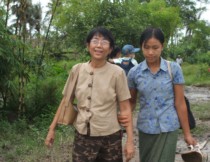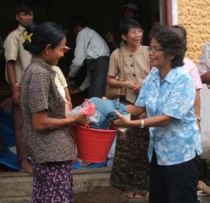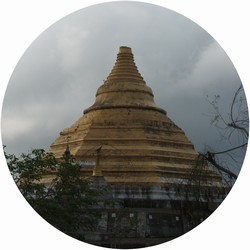Pilakhat and PadawaKyay
Dear K ~ I've been intending to write this letter for a long time, and only now getting to it, to tell you about the trip I made in the company of your little aunt on 27 July. I sent you the photos some time ago. I knew you were working on your book, so I let myself dally too.
We again went to the KyaukTan area, to the village PadawaKyay where we had been before. As we had run out of cooking pots on that previous trip, I had promised to bring more pots, 60 more. As there are lots of children there, we took clothes for them. We were told there are 205 households altogether, so I had bought 205 blankets. Also, I got mosquito nets, big enough for two people to sleep under. They are quite costly, 205 of those would have cost over $1000! So I decided I would ask the headman's advice when we got there, which households were poorest and would not have mosquito nets, and bought only as many as we could afford this time.
For all the households, we took rice and Indian lentils. The vehicle we had this time could not take a lot of weight so in fact we took lentils from Yangon, and got the rice in KyaukTan.
KyaukTan produces rice, so I had decided to unload the Yangon stuff at the village, then go to the rice mill and have the car load up with rice.
The young people were not on this trip, MaH and her doctor friends did not come along. This time, it was your little aunt, her older cousin, myself, and a colleague who used to work at the same charity as me (Free Funerals Service; those in need of burial are buried with care for free; and those remaining who are in need of medical attention have a free clinic). And the two young girls whom I have taken in to live with us, they came along on this trip (these are two Delta refugees, the nun brought them to my friend's home, see letter of June 15th).
The car fetched your aunt and her cousin about 7.30am and we set out from my house at 8am, reaching KyaukTan about 9.30am. We stopped by the rice mill to ask for prices and were told that donations had not yet reached a very poor village called Pilakhat. So we found ourselves changing plans.
It wasn't far from KyaukTan but the way is so terrible that it took us quite a while to get there. Being in the monsoon season, the dirt roads are awash, they are mud tracks, and the car wheels often could not get traction. When we reached our destination, we found that there is a fork in the road, one led to Indian Pilakhat, the other to the Burmese Pilakhat. We took the turn for the latter. When we got there, I saw that the houses were in better condition than those in the village we had planned this trip for (PadawaKyay). And there were only 70 households. As we had arrived in their village, they of course were asking for the donations. And as we were there, we went ahead and donated.

They have built their huts in the paddy fields. The road was through the fields, so we had to make our way walking through the paddy. We were refreshed by the good clean air, our hearts were clear and tender.
From this village, we returned to KyaukTan, bought the rice, and headed for PadawaKyay village.
There, I took the list of householders, and by means of a
'lucky dip', we distributed the mosquito
nets. As
our blanket supply had been reduced by 70, those
who didn't strike luck with the mosquito nets got
blankets. We
had lots of clothes to donate, so we managed to
hand out something to
everyone.  And
of course, every household got rice and
lentils. And
those who had not got a cooking pot on our first
trip got theirs this time.
And
of course, every household got rice and
lentils. And
those who had not got a cooking pot on our first
trip got theirs this time.
This is quite a poor village, and with a lot of people too. When you come down from the bridge, there is a derelict house; three persons sleeping in it would fill it, I think. I will send a photo. In this house, there is an elderly mother, a son who has suffered a stroke, he is an alcoholic, and his 4 year old child. On the first trip, when the other households received a cooking pot each, out of pity for the old lady and her son, I had given two pots. In the distribution this time, I gave them a mosquito net.
When the time came to leave, I dropped by at their house. The pots I had given them two weeks before had disappeared, they had been sold off! (in Burmese, the term is 'yaung-saa' : 'sell-eat'). I asked, and where is the mosquito net? I was told that it was being kept in another house; I guess it had been sold already! For them, more than anything else they are in need of food.
So I learned this : whatever is given out, if there is not enough food to eat, the people will sell the things to buy the food.
When there are so many people with no means to earn a living, existing like this in poverty, what can I do to help? Think it over, Kinthissa.

